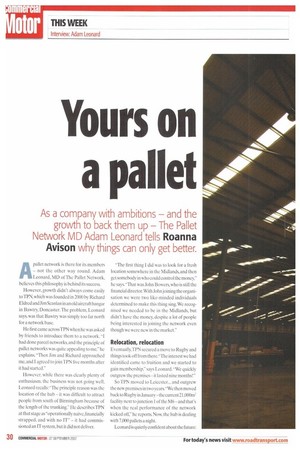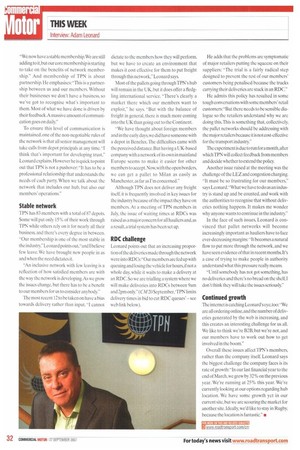Yours on a pallet
Page 30

Page 32

If you've noticed an error in this article please click here to report it so we can fix it.
As a company with ambitions — and the
growth to back them up — The Pallet Netvvork MD Adam Leonard tells Roanna
Avison why things can only get better.
Apallet network is there for its members not the other way round. Adam Leonard, MD of The Pallet Network, believes this philosophy is behind its success.
However, growth didn't always come easily to TPN, which was founded in 2000 by Richard Eldred and Jim Scanlan in an old aircraft hangar in Baw-try, Doncaster. The problem, Leonard says, was that Bawtry was simply too far north for a network base.
He first came across TPN when he was asked by friends to introduce them to a network.'! had done parcel networks, and the principle of pallet networks was quite appealing to me," he explains. "Then Jim and Richard approached me, and! agreed to join TPN five months after it had started."
however, while there was clearly plenty of enthusiasm. the business was not going well. Leonard recalls: "The principle reason was the location of the hub it was difficult to attract people from south of Birmingham because of the length of the trunking." He describes TPN at that stage as "operationallynaïve, financially strapped, and with no IT" it had commissioned an IT system, but it did not deliver. "The first thing I did was to look for a fresh location somewhere in the Midlands, and then get somebody in who could control the money." he says. "That was John Bowers, who is still the financial director. With John joining the organisation we were two like-minded individuals determined to make this thing sing. We recognised we needed to be in the Midlands, but didn't have the money, despite a lot of people being interested in joining the network even though we were new in the market."
Relocation, relocation Eventually, TPN secured a move to Rugby and things took off from there.-The interest we had identified came to fruition and we started to gain membership," says Leonard. "We quickly outgrew the premises-it lasted nine months!"
So TPN moved to Leicester... and outgrew the new premises in two years:1W then moved back to Rugby in Januarythe current 21,000m= facility next to junction 1 of the M6 and that's when the real performance of the network kicked off," he reports. Now, the hub is dealing with 7,000 pallets a night.
Leonard is quietly confident about the future: "We now have a stable membershi p.We are still adding to it, but our core membership is starting to take on the benefits of network membership." And membership of TPN is about partnership. He emphasises: "This is a partnership between us and our members. Without their businesses we don't have a business, so we've got to recognise what's important to them. Most of what we have done is driven by their feedback.A massive amount of communication goes on daily" To ensure this level of communication is maintained, one of the non-negotiable rules of the network is that all senior management will take calls from depot principals at any time. "I think that's important for developing trust," Leonard explains. However he is quick to point out that TPN is not a pushover: "It has to be a professional relationship that understands the needs of each party. When we talk about the network that includes our hub, but also our members' operations."
Stable network
TPN has 83 members with a total of 87 depots. Some will put only 15% of their work through TPN while others rely on it for nearly all their business, and there's every degree in between. "Our membership is one of the most stable in the industry," Leonard points out,"and I believe few leave. We have brought new people in as and when the need dictates it.
"An inclusive network with few leaving is a reflection of how satisfied members are with the way the network is developing.As we grow the issues change, but there has to be a benefit to our members for us to consider anybody."
The most recent 1210 be taken on have a bias towards delivery rather than input. "I cannot dictate to the members how they will perform, but we have to create an environment that makes it cost effective for them to put freight through this network," Leonard says.
Most of the pallets going through TPN's hub will remain in the UK, but it does offer a fledgling international service. -There's clearly a market there which our members want to exploit," he says. "But with the balance of freight in general, there is much more coming into the UK than going out to the Continent.
"We have thought about foreign members and in the early days,we did have someone with a depot in Benelux. The difficulties came with the perceived distance. But having a UK-based company with a network of its own in mainland Europe seems to make it easier for other members to accept. Now,with the open borders, we can get a pallet to Milan as easily as Manchester, as far as I'm concerned."
Although TPN does not deliver any freight itself, it is frequently involved in key issues for the industry because of the impact they have on members. At a meeting of TPN members in July, the issue of waiting times at RDCs was raised as a major concern for all hauliers and, as a result, a trial system has been set up.
RDC challenge
Leonard points out that an increasing proportion of the deliveries made through the network were into RDCs:"Our members are fed up with queuing and losing the vehicle for hours,if not a whole day, while it waits to make a delivery at an RDC. So we are trialling a system where we will make deliveries into RDCs between 9am and 2prn only." (CM 20 Septernber,'TPN limits delivery times in bid to cut RDC queues' — see web link below). He adds that the problems are symptomatic of major retailers putting the squeeze on their suppliers: "The trial is a fairly radical step designed to prevent the rest of our members' customers being penalised because the trucks carrying their deliveries are stuck in an RDC."
He admits this policy has resulted in some tough conversations with some members' retail customers: "But there needs to be sensible dialogue so the retailers understand why we are doing this. This is something that, collectively, the pallet networks should be addressing with the major retailers because it is not cost-effective for the transport industry."
The experiment is due to run for a month, after which TPN will collect feedback from members and decide whether to extend the policy.
Another issue raised at the meeting was the challenge of the LEZ and congestion charging. "It must be so frustrating for our members," says Leonard."What we have to do as an industry is stand up and be counted, and work with the authorities to recognise that without deliveries nothing happens. It makes me wonder why anyone wants to continue in the industry."
In the face of such issues, Leonard is convinced that pallet networks will become increasingly important as hauliers have to face ever-decreasing margins: "It becomes a natural flow to put more through the network, and we have seen evidence of that in recent months. It's a case of trying to make people in authority understand what this pressure really means.
"Until somebody has not got something, has no deliveries and there's no bread on the shelf, I don't think they will take the issues seriously."
Continued growth
The internet is catching Leonard's eye,too: "We are all ordering online, and the number of deliveries generated by the web is increasing, and this creates an interesting challenge for us all. We like to think we're B2B, but we're not, and our members have to work out how to get involved in the boom."
Overall these issues affect TPN's members, rather than the company itself. Leonard says the biggest challenge the company faces is its rate of growth: -In our last financial year to the end of March, we grew by 32% on the previous year. We're running at 25% this year. We're currently looking at our options regarding hub location. We have some growth yet in our current site, but we are scouring the market for another site. Ideally, we'd like to stay in Rugby, because the location is fantastic." •


























































































































































































